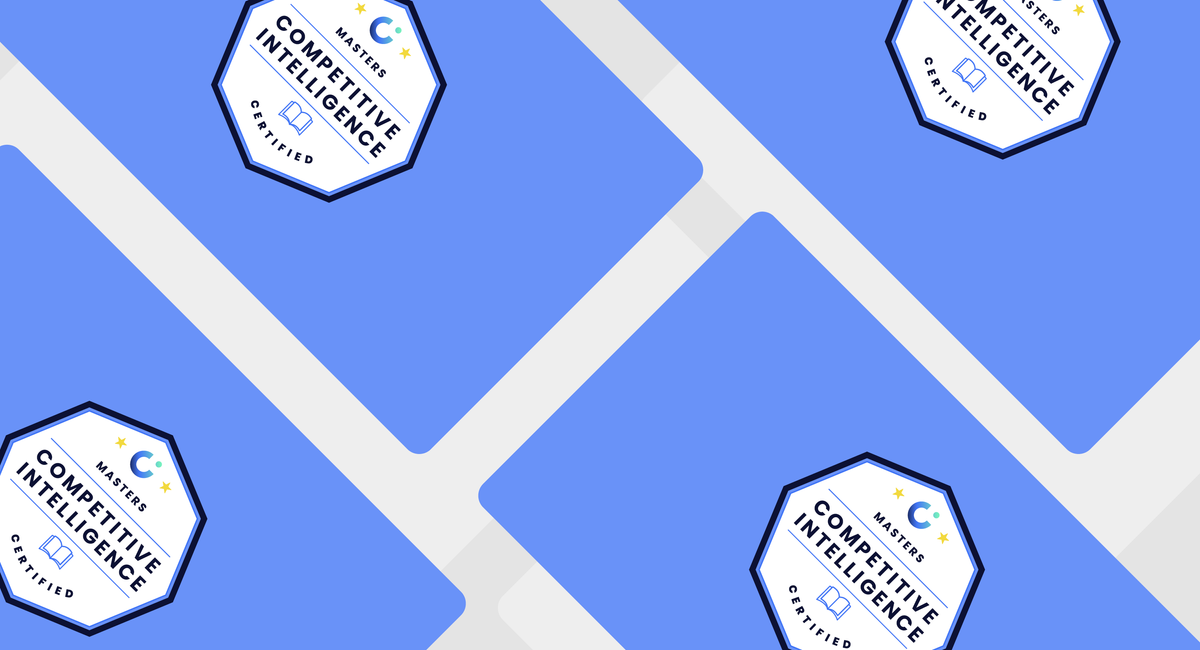If you’re a hiring manager tasked with bringing a competitive intelligence (CI) professional on board, you might feel a bit out of your depth. And that’s okay! CI is one of those roles that often lands in the laps of folks who aren’t necessarily familiar with what it actually entails.
Whether you’re in product marketing, sales, or product management, you’ve probably noticed that CI isn’t always its own department. Instead, it’s often woven into other functions, and that’s where things can get tricky.
Hiring the right CI professional isn’t just about finding someone who can crunch numbers or compile reports. It’s about finding someone who understands the full scope of what CI can offer – someone who can help your team see around corners and anticipate your competitors’ next moves.
So, how do you ensure you’re hiring the right person for a CI role, and more importantly, setting them up to succeed? That’s what I’m here to help with.
Drawing on nearly 20 years of experience in the field, as well as conversations with other CI professionals, I’ll share some tips and insights to help you better understand what makes a great CI hire, how to avoid common hiring pitfalls, and how to set your new hire – and your organization – up for success.
Let’s get into it.
Understanding CI's role and placement in organizations
One of the biggest challenges when setting up a competitive intelligence function is figuring out where it should live within your company. Is it a part of product marketing? Should it sit with sales? Or maybe it's better off under the product team?
The answer is – it depends! CI is a bit of a chameleon; it can thrive in different places depending on what your organization needs most.
If your focus is on understanding market positioning and how your competitors are selling their products, then placing CI under product marketing might make the most sense. Here, CI can help you dig into competitors’ go-to-market strategies, pricing, and branding, giving your marketing team the insights they need to differentiate your product and sharpen your messaging.
If you’re in a very technical industry – say, you’re developing cutting-edge AI tools – then CI might be more valuable in a technical department. Why? Because here, it’s not just about what your competitors are saying, but what they’re building. Here, CI can help you get into the weeds of product capabilities and how your offerings stack up against the competition in terms of features and performance.
But remember, no matter where CI sits, the key is not to limit its scope. I’ve seen CI teams stuck in sales, only cranking out battlecards and win/loss reports. Sure, those things are useful, but they’re just a fraction of what CI can offer. CI should be your company’s secret weapon, providing insights that fuel strategies across the board – from marketing and product development to long-term business planning.
Advice for non-CI managers
If you’re a non-CI manager suddenly tasked with hiring or managing a CI professional, you might be thinking, “Where do I even start?”. Here’s the good news: you don’t need to be a CI expert to set your team up for success. There are just a few key things to do.
Understand the full scope of CI
First, you need to recognize that CI is more than just gathering data or creating battlecards. It’s about connecting the dots between market trends, competitor moves, and your company’s strategy.
Your CI hire needs the space to think strategically, not just reactively. So, avoid the temptation to narrow their role to just sales support or basic market analysis. Give them the freedom to explore and analyze broadly so they can provide real insights that benefit the entire organization.
Educate yourself on CI essentials
Second, educate yourself on what good CI looks like. Spend some time learning about the different aspects of CI – like market research, product comparisons, and strategic recommendations – so you can better understand the value it brings. This will help you set more realistic expectations and give your CI team the support they need to shine.
Foster open communication and integration
Finally, communicate openly with your CI team. Make sure they know you’re there to support them, even if you’re not a CI expert. Encourage them to share their findings regularly and involve them in strategic discussions. The more integrated they feel, the more value they’ll bring.
And remember, CI is all about perspective – sometimes they’ll need to deliver tough truths. Be open to hearing them, even if it’s not what you were hoping for.
By understanding these basics, you’ll be well on your way to making the most of your CI function, even if it’s new territory for you.
Crafting effective job descriptions
Let’s talk about job descriptions for a sec. If you’re looking to hire a CI professional, the job description is where you set the stage. But here’s the kicker: too often, these descriptions are either too vague or too narrowly focused, and both of these issues can scare off the talent you want to attract.
I’ve seen job postings that are labeled as CI roles but sound more like they’re hiring for a sales enablement specialist. Everything is about “building battlecards” or “supporting sales with talking points.” If that’s what you need, great – just be upfront about it. Call it what it is: a sales enablement role with some CI elements. Don’t call it a CI role if all you're looking for is deal support.
Trust me, CI professionals can spot these red flags a mile off, and they’re not going to be interested in a role that’s just one narrow slice of what they do.

On the flip side, some descriptions are so generic that they don’t say anything about what the job actually entails. If you’re just copying and pasting from a template or using phrases like “conduct market analysis,” you’re not giving potential hires a clear picture of the role.
Remember, CI is a multifaceted field. Your job description should reflect that complexity by outlining the full range of responsibilities – from gathering and analyzing intelligence to making strategic recommendations.
A good job description should excite CI professionals. It should show that you understand the value they bring and that you’re looking for someone who can contribute at a high level. So, don’t just list tasks – talk about the impact you want them to have.
When you craft a job description that speaks to the heart of what CI is all about, you’ll attract the kind of talent that can really make a difference in your organization.
Key skills and qualities for CI professionals
So, you know what you need from your CI hire, you’ve posted a tantalizing job description to attract the right kind of talent, and the applications have started to pour in. Now, how do you determine who’s going to be the best fit for your company?
As I always say, “Don’t trust resumes.” Sure, experience and qualifications matter, but the best CI professionals bring a lot more to the table than just a list of past jobs and diplomas. There are a few key skills and qualities that really make a great CI hire, and they’re worth paying attention to.
First off, curiosity is huge. A great CI professional is naturally curious – someone who loves to dig deep, ask questions, and figure out the “why” behind what’s happening in the market. You want someone who isn't satisfied with the surface-level answer and is always looking for that extra layer of insight.
Analytical thinking and critical thinking are also crucial. CI is all about connecting the dots, spotting trends, and challenging assumptions. Your CI hire should be someone who can look at data from all angles, think strategically about what it means for your company, and isn’t afraid to go against the grain when necessary.

And let’s not forget communication skills. The best CI insights are worthless if they’re not communicated effectively. You need someone who can clearly present their findings, tailor their message to different audiences, and influence decision-making across the organization.
Sometimes, that also means delivering hard truths that people don’t want to hear. It's not about just telling product teams “You’re doing great! Our product is the best on the market!”; it's about providing a clear, unbiased view of the competitive landscape – even if that means challenging existing beliefs or strategies.
A great CI professional knows how to do this tactfully but firmly, so the organization can make informed decisions based on reality, not wishful thinking.
So, when you're hiring, don't just look for a CI professional with impressive logos and certifications on their resume – look for someone who brings all the right qualities to the table. They’re the ones who will drive real value and help your organization stay ahead of the competition.
Testing your CI candidates' aptitudes
When it comes to hiring competitive intelligence (CI) professionals, the mantra should be “Test aptitude, hire for attitude.”
Traditional hiring methods – like scrolling through resumes or asking standard interview questions – won’t cut it because they don’t capture the full range of what CI professionals can bring to the table. That’s why it’s time to think outside the box and use more innovative hiring practices that truly test a candidate’s abilities.
One of the most effective approaches I’ve seen is incorporating real-world challenges into the interview process. Instead of just asking about their past experience or hypothetical situations, give candidates a practical test that mirrors the work they’ll be doing. For example, provide them with a scenario:
“Here’s our company, and here’s one of our competitors. You have 24 hours to research, analyze, and come back with a strategic recommendation.”
This exercise isn’t just about testing their research skills – it’s about seeing how they think on their feet, how they connect the dots, and how they communicate their insights.
Once the candidates have completed their research, don’t stop there. Give them a full hour to present their findings and answer your questions. This isn’t a speed test – it’s about depth and clarity. You want to see how they structure their thoughts, how well they understand the competitive landscape, and how effectively they can convey their recommendations.
The Q&A is particularly revealing because it shows you how candidates handle pressure, think critically on the spot, and defend their analysis. You’re not just looking for the right answers; you’re looking for their ability to engage in a strategic discussion, explain their reasoning, and adapt to new information on the fly.
By setting up these real-world challenges and discussions, you can get a better feel for their potential and see who can think strategically, not just reactively.
Developing career paths for CI professionals
You’ve hired the perfect candidate for your CI role – congratulations! 🥳 Now you can sit back and let them bring you competitive insights until the end of time, right?
Wrong!
Competitive intelligence is an exciting field with a lot of potential, but here’s a hard truth: too many organizations don’t think about where CI professionals can go next.
I’ve seen it happen time and time again – CI folks are brought in to do great work, but then there’s no clear path for them to advance. And guess what? They leave.
A lot of CI professionals start as analysts, diving into the data and learning how to connect the dots. But where do they go from there? What’s the path to becoming a strategist, a manager, or even a director of competitive intelligence?
Having a clear career path isn’t just about titles or promotions; it’s about recognizing the value CI professionals bring to the table and making sure they know they have a future with your organization. This could mean creating roles that go beyond basic intelligence gathering and focus on strategic influence, cross-functional leadership, or even building out a CI team.
So, if you want to keep your CI talent engaged and motivated, show them that there’s room to grow. Lay out a path that rewards their expertise and drive. Because when CI pros see a future for themselves, they’re more likely to stick around and continue delivering valuable insights that drive your company forward.
The case for a dedicated CI function
Imagine if you had a dedicated CI function within your organization, led by someone who eats, sleeps, and breathes competitive strategy. That’s the dream scenario.
Why? Because when CI is a stand-alone function, it has the freedom to offer a full, unbiased view of the competitive landscape.
You’re not just feeding the needs of one department; you’re providing insights that can drive strategy across the entire company – keeping tabs on what competitors are doing, spotting trends, and providing actionable intelligence that informs everything from product development to sales tactics.
In an ideal world, CI would report directly to the C-suite, rather than being buried in another function where priorities can get skewed. That way, the CI function has the autonomy to deliver the good, the bad, and the ugly – without the risk of it being filtered to fit a particular narrative. After all, you want to get the full picture, not just the version that makes one team look good.
Bottom line: a dedicated CI function empowers your organization to make smarter, more informed decisions, and as markets grow ever more crowded, that’s not just nice to have – it’s essential.
Key takeaways
Hiring the right competitive intel professional and setting them up for success might seem challenging, especially if you’re not from a CI background. But with the right approach, you can build a strong CI function that delivers real value across your organization.
Here are some key takeaways to keep in mind:
👀 Understand the full scope of CI: CI is more than just data collection – it’s about providing strategic insights that drive smart decisions.
📝 Craft effective job descriptions: Make sure your job postings reflect the true breadth of CI work, not just a narrow focus on one aspect.
🕵️ Test aptitude, hire for attitude: Use real-world challenges in your hiring process to find candidates who are not only skilled but also adaptable and strategic thinkers.
🚀 Develop clear career paths: Show your CI hires that there’s room to grow within your organization to keep them engaged and motivated.
💪 Advocate for a dedicated CI function: Consider the benefits of having a stand-alone CI team that can offer unbiased, comprehensive insights.
🤝 Support your CI team, even if you’re not an expert: Learn about CI, keep communication open, and encourage them to deliver the full value they can offer.
With these strategies, you’re not just hiring for a role – you’re building a powerhouse that will keep your company ahead of the curve. Stay curious, keep learning, and watch your competitive strategy thrive!






.png?v=0501614a4a)